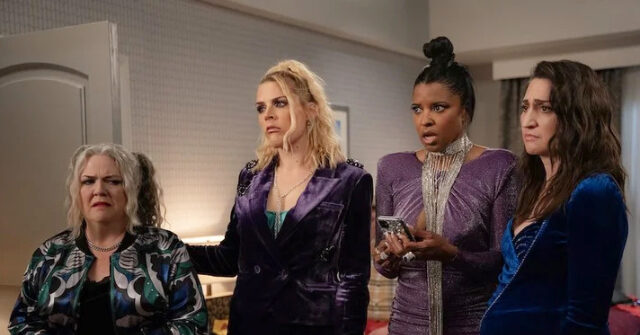LGBTQ activists are increasingly alarmed by the recent trend of cancelations affecting gay-friendly streaming and television shows, signaling a potential decline in progressive representation in U.S. culture. One of the more notable recent cancelations is that of “Girls5Eva,” a comedy series that was first launched on the Peacock streaming platform in 2021. The show, which features significant LGBTQ representation, was initially canceled by Peacock after its second season. Netflix subsequently picked it up, granting it a third season, but soon announced that there would be no fourth season. The show’s cancellation highlights a broader concern among activists regarding the diminishing platforms available for LGBTQ narratives.
“Girls5Eva” was executive produced in part by comedian Tina Fey and chronicles the lives of former members of a 1990s girl band who, after experiencing a resurgence in popularity due to a sampling of their hit song by a rapper, attempt to navigate their complicated personal and professional lives in their 40s. The series features multiple gay characters, including a significant lesbian character portrayed by Paula Pell, who is openly lesbian in both her role and real life. “Girls5Eva” received critical acclaim, with three Emmy nominations and recognition from progressive outlets like Slate, which named it one of the best shows of 2024. Its cancelation has left many in the LGBTQ community feeling disheartened, particularly in the context of a larger trend of diminishing representation in media.
The announcement of the show’s end came from series co-star Busy Philipps, who shared the news on her podcast. Philipps expressed frustration, stating that the show was “dead” and implying that viewer engagement may not have been sufficient to merit another season. She noted that Netflix likely had no intentions for further renewal, as the original contract was only for one season after acquisition. Her candid remarks reflect the uncertainties faced by many LGBTQ projects, which may struggle for audience attention despite their critical acclaim.
In reaction to a wave of cancellations, LGBTQ-centric media outlets, such as Pink News, have voiced their concerns that “Girls5Eva” is part of a troubling trend for queer representation on television. GLAAD, a prominent LGBTQ advocacy organization, has highlighted these concerns in its 2024 “Where We Are On TV” report, revealing a significant drop in LGBTQ characters on television. According to the report, out of 468 LGBTQ characters tracked, at least 170 will not be returning for the next season, with around 24 percent of those cancellations tied directly to show terminations.
The impact of these cancellations extends far beyond individual shows. The trend underscores a wider cultural shift that seems to favor the removal of LGBTQ narratives from mainstream media. Even prominent entertainment companies such as Disney have begun to retract existing LGBTQ content, with recent reports indicating that they have removed transgender subplots from children’s programming. For instance, a planned episode in the children’s series “Win or Lose” was rescinded, and a similar fate met an episode from “Moon Girl and Devil Dinosaur.” These decisions have raised alarms among activists who fear that such actions contribute to a larger narrative that minimizes the visibility and representation of LGBTQ individuals in popular culture.
As the landscape of television and streaming evolves, the early 2020s have seen a shocking number of LGBTQ-inclusive shows facing the chopping block, leaving many advocates questioning the cultural climate surrounding these narratives. The cancellation of shows like “Girls5Eva,” coupled with broader patterns of content removal by major companies, marks a troubling era for LGBTQ representation. Activists call for renewed attention to the issues of visibility and inclusion in media, emphasizing the importance of diverse storytelling that reflects the spectrum of human experience and connects with audiences across different demographics.

